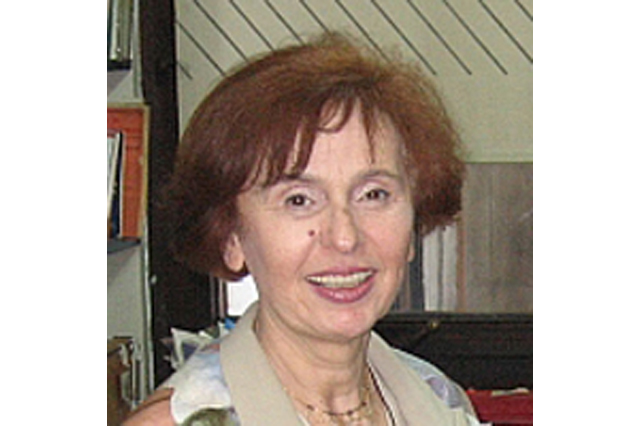Honorary Members of the SBS

Professor Vesna Niketić (née Raičević) (Belgrade, 1947) graduated chemistry at The Faculty of Chemistry, University of Belgrade (1970). Soon after graduation she joined The Danish Institute of Protein Chemistry in Copenhagen (1971-1974) where she mastered the state-of-the-art techniques and methods of protein sequence determination (the forefront research at that time!). She joined Faculty of Chemistry in 1975 remaining there until her retirement (2012) passing through all positions, from teaching assistant to full professor.
Scientific activities of professor Niketić were centered mainly on three themes: (a) chemical and post-translational modifications of proteins, (b) prebiotic synthesis and chemical evolution, and (c) chemistry and biochemistry of nitrogen monoxide (NO).
It is worth noting that many of research was done and published in the most difficult recent period (1990-2000) for our country (experiencing inflation, civil war, UN sanctions, NATO bombardment, and associated shortages of many research supplies.)
Professor Niketic was actively engaged in teaching of a number of biochemical basic and advanced courses for undergraduate and graduate students of chemistry and biochemistry. She established Biochemistry of proteins and nucleic acids as one of the basic courses for biochemistry students, and Biochemistry and Biophysics of macromolecules for graduate students of biochemistry. She wrote the book Principles of structure and function of proteins (1995)1 which is still widely used as a textbook. In addition, she prepared a substantial amount of various teaching materials for the courses she held. She supervised diploma, magister and Ph.D theses of a number of excellent students and continued to follow closely their further progress into successful researches in academia or industry. She was engaged in many professional activities at the Faculty of Chemistry, particularly in establishing and organization of the Biochemistry study group.
Professor Niketić served to the Serbian Biochemical Society (SBS) from its beginning (1976) until her retirement. She was particularly engaged in consolidation of the Society after decomposition of former Yugoslavia and its registration into FEBS (1998). In years to come this brought to biochemistry researches in Serbia much benefit (just to mention substantial FEBS donation in instruments and literature and a number of stipends for conferences and visits of young scientists to research laboratories in Europe). Professor Niketić was elected a honorary member of SBS in 2013.
Selected references

Dr Gordana Grubor-Lajšić (23. 9. 1949 – 29. 10. 2015), was Full Professor at the University of Novi Sad. She was born in Banja Luka (Bosnia and Herzegovina, SFR Yugoslavia) on the 23rd of September 1949. Prof. Grubor-Lajšić completed her primary school and Grammar school “Jovan Jovanović Zmaj” in Novi Sad. She obtained BSc. degree in chemistry in 1972 at the University of Novi Sad, Faculty of Sciences, she defended in 1976 her MSc. Thesis in biochemistry entitled “Hemoglobin of the common pheasant” at the University of Belgrade, Faculty of Sciences and her PhD thesis entitled “Biochemical survey the on system of cryoprotectants in insects – Ostrinia nubilalis” in 1984 at the University of Novi Sad, Faculty of Sciences. From 1977 until 1986 Professor Grubor-Lajšić worked at the Clinical Centre in Niš in the laboratory of nephrology as a biochemist and in 1986 she specialized in clinical biochemistry at the Medical Faculty, University of Niš.
At the Department of Biology and Ecology, Faculty of Sciences, University of Novi Sad, she was first appointed as a teaching assistant in biochemistry in 1973 and later as Assistant professor in 1986, Associate professor in 1991 and finally Full professor in 1996. Apart from teaching Biochemistry, as a fundamental course and she had introduced new courses such as Mechanisms of Ecological Adaptations, Clinical Biochemistry, Biochemistry of Diet and Nutrition, Biochemisty 2, Enzymes and metabolic regulation and many others at various levels of academic studies. She was one of the leading Professors who established new study programmes at the Faculty of Sciences – namely, Bachelor studies in Biochemistry in 2000 and Bachelor studies in Molecular Biology in 2003. Professor Grubor-Lajšić was an excellent educator, a strict Professor and mentor who was highly respected by her students. Overall, Professor Grubor-Lajšić mentored more than 50 BSc Theses, 10 Masters Theses and 9 PhD Theses.
The main focus of research for Professor Grubor-Lajšić was on insect cold hardiness, especially in a species of moth, the European corn borer, Ostrinia nubilalis. Her pioneer work on cryoprotective mechanisms in overwintering caterpillars of O. nubilalis resulted in her PhD thesis under the supervision of Professor Vera Planački. Later her research was focused on deciphering antioxidative mechanisms that govern insect diapause and cold hardiness. She conducted a significant number of mutual scientific experiments with her dear and respected colleagues – full professor Dr. Mihajlo Spasić and research professor Dr. Duško Blagojević, from the “Siniša Stanković” Institute for Biological Research in Belgrade. Moreover, in 1987, Gordana was a visiting Fulbright Scholar at the University of Massachusetts, Amherst, Massachusetts, USA working with Professor John H. Nordin on the biochemistry of insect diapause and overwintering. Later, in 1989, as a holder of a prestigious Research Fellowship of the Royal Society, Professor Grubor-Lajšić spent a year at the British Antarctic Survey (BAS) in Cambridge,UK, undertaking collaborative research on insect cold hardiness with highly respected eco-physiologists, Dr. William Block, and Dr. Roger Worland. Gordana continued her productive research collaboration with BAS culminating in their participation on a joint European FP6 project on animal dormancies. This joint research on cold hardiness of arthropods was published in 11 original scientific articles in peer-reviewed journals as well as in a book chapter published by Springer-Verlag. Apart from insect eco-physiology, Gordana also participated in a range of bio-medical and veterinary research projects.
Overall, she published more than 40 research articles in international journals, 12 articles in domestic journals, 3 book chapters in international monographs and 2 academic textbooks in Serbian language. Professor Grubor-Lajšić participated in more than 10 research projects national and international and headed 4 projects. According to SCOPUS database, prof. Grubor-Lajšić has 990 citations and h-index 17 (as of 1st March 2022).
As a Professor, mentor and colleague, Gordana has left an unforgettable mark on the Faculty of Sciences (Novi Sad) and the Serbian Biochemical Society. She was an engaging, highly motivated and passionate scientist, a devoted educator and above all – a wonderful human. Her colleagues will remember her as an honest and reliable friend, always eager to listen and to help. She is greatly missed by all who had the good fortune to know her.
Selected Bibliography

Professor
After finishing his Ph.D. (1986), professor Spasić worked in professor A. M. Michelson's group at the Institute for physicochemical biology (Institut de Biologie Phusico-Chimie) in Paris (1987-1988). He continued his scientific work at Institute for biological research “Siniša Stanković” in Belgrade that started in 1978. Besides scientific positions (from graduate researcher to scientific councilor) at the Institute, professor Spasić was a member of the Collegial management body (1986-1993), Steering Committee (1993-2005), Chairman of the department for Physiology, and chairman of a few projects of Ministry for science and technological development of Serbia. He worked as a professor at the University of Belgrade at the Faculty of Chemistry, Department of Biochemistry (from assistant professor to full professor), as well as on Ph.D. studies at Medical Faculty. during his teaching activities, he co-authored two books used as material for Biochemistry students.
Professor Spasić was the president of the Serbian Biochemical Society (2011-2017) and was honored with a Medal of Serbian Physiological Society 2018 for his contribution to society and science. Scientific papers of professor Spasić and his coworkers which counted over 190 and had more than 2400 citations contributed significantly to the concept of adaptive homeostasis.
Selected publications (10)

Professor Miroslav M. Vrvić (1952 - 2024) was born in Vršac. He finished elementary school and high school in Zaječar. He enrolled in chemistry at the Faculty of Science and Mathematics in Belgrade in 1971, and graduated in 1975. He defended his doctoral dissertation entitled "Effect of thion bacteria on sulfide substrates: fundamental and applied aspects" at the same faculty in 1991. In 2021/22. he enrolled in the academic master's studies in nutrition and supplementation at the Faculty of Medical Sciences in Kragujevac, which he completed in the same academic year with the defense of the master's thesis "CoViD-19: Supplementation with vitamins and minerals in prevention and rehabilitation" and obtained the academic title of MS in Nutrition and Supplementation.
He started working at the Department of Chemistry of Natural Products (now the Department of Biochemistry) of the Chemistry Institute of the Faculty of Science (now the Faculty of Chemistry) of the University of Belgrade as a volunteer in 1976, and was employed as an assistant trainee in 1977. He obtained all titles (assistant professor-1992, associate professor-1997 and full professor-2003) at the same department and the same faculty, from which he retired in 2017. In the same year, he was elected as a scientific advisor for chemistry. He is a biocides instructor in the process of training a chemical advisor.
The area of predominant interest, scientific research work and application of the results is the chemical and biochemical activity of microorganisms, especially biogeochemical, as well as in the biotechnology of the environment, food and function and biologically active substances.
The first teacher of the Faculty of Chemistry was chosen for the subject of the basics of biotechnology. He taught a group of biotechnology subjects at undergraduate, master's and doctoral studies, as well as subjects in the field of food and nutrition, ecological and green (bio)chemistry... He was a mentor at almost 200 graduate/final, specialist, master's and master's theses. He supervised the preparation of 26 defended doctoral theses.
He is the author and co-author of about 500 references, including patents and technical solutions in application and products on the market, as well as 145 scientific papers from the SCI list, which according to Scopus as of May 9, 2023, were cited 2576 times (cited without self-citations is 2058) with an h-index of 24. He participated and managed the realization of several dozen international and domestic projects and projects of cooperation with the economy. Currently (2023), he is participating in the implementation of two international projects ("Development of an innovative process for the production of CBD oil from industrial hemp flowers and new high-tech products-extracts from organic agricultural raw materials", IRI-EU-Croatia-Serbia, 2021-2024 and Twinning " Microplastic-Free Environment"-GREENLand, Horizon-Widera, EU-Serbia-Germany-Ireland, 2023-2025.) He gave several lectures by invitation in the country and abroad. He was in about twenty countries on all continents (except Antarctica) for about 40 shorter study stays (up to a month) and professional visits (universities, institutes, industry).
He is a member of the Serbian Biochemical Society, the Association of Microbiologists of Serbia, the Nutrition Society of Serbia, the American Chemical Society (ACS), the American Society for Microbiology (ASM) and the American Association for the Advancement of Science (AAAS). He is a co-founder and member of the Society for Food Technology of Serbia. He was a member of the Serbian Chemical Society for almost 40 years, until 2013.
He is the recipient of the "Medal for outstanding merits in the application of science in industry" of the Serbian Chemical Society for the year 2000. In 2015, he received from the Association of Microbiologists of Serbia a "Certificate of Appreciation for years of selfless support to the work".
Selected publications (10)


